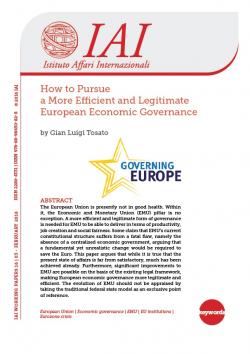How to Pursue a More Efficient and Legitimate European Economic Governance
The European Union is presently not in good health. Within it, the Economic and Monetary Union (EMU) pillar is no exception. A more efficient and legitimate form of governance is needed for EMU to be able to deliver in terms of productivity, job creation and social fairness. Some claim that EMU’s current constitutional structure suffers from a fatal flaw, namely the absence of a centralised economic government, arguing that a fundamental yet unrealistic change would be required to save the Euro. This paper argues that while it is true that the present state of affairs is far from satisfactory, much has been achieved already. Furthermore, significant improvements to EMU are possible on the basis of the existing legal framework, making European economic governance more legitimate and efficient. The evolution of EMU should not be appraised by taking the traditional federal state model as an exclusive point of reference.
Paper prepared within the context of “Governing Europe”, a joint project led by the Istituto Affari Internazionali (IAI) and Centro Studi sul Federalismo (CSF) of Turin in the framework of the strategic partnership with Compagnia di San Paolo, International Affairs Programme. Publ. in: Lorenzo Vai, Pier Domenico Tortola, Nicoletta Pirozzi (eds.), Governing Europe. How to Make the EU More Efficient and Democratic, Bruxelles [etc], P.I.E-Peter Lang, 2017, 248 p. (Federalism ; 8), ISBN 978-2-8076-0058-4 (pbk); 978-2-8076-0059-1 (pdf); 978-2-8076-0060-7 (EPUB); DOI: 10.3726/b10699.
-
Details
Roma, IAI, February 2016, 14 p. -
Issue
16|03 -
ISBN/ISSN/DOI:
978-88-98650-82-8
Introduction
1. The measures adopted during the crisis
2. The ensuing evolution of the EMU
3. The differentiation between euro and non-euro States
4. The legal bases of the anti-crisis measures
5. Towards an enhanced EMU: the Presidents’ Reports
6. The available legal instruments
7. Input legitimacy issues: the legislative function
8. The executive function
9. Output legitimacy issues
Concluding remarks
Topic
Tag
Related content
-
Ricerca27/01/2015
Governing Europe
leggi tutto



